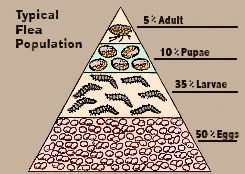 There has been much speculation as to whether or not fleas are becoming immune to flea treatments on the market.
There has been much speculation as to whether or not fleas are becoming immune to flea treatments on the market.
Just whether or not flea treatment resistence is a reality has not been widely studied. In fact, I blogged about the Bayer Animal Health-funded Flea Susceptibility Monitoring program being the first and only companion animal parasite study about flea immunity.
However, any animal professional worth their salt questions studies funded by groups who produce the products. Why? Sales would benefit from any results that showed that no resistance to those products.
Even when “internationally renowned, independent researchers” are conducting the studies it still flags common sense questions.
So, out in the real world people are questioning whether or not fleas are developing resistance to flea treatments.
There are reasons behind the theory.
First, is that many flea treatments are reported to need application sooner than suggested on the packaging.
Some professionals are even recommending an oral flea treatment as a supplement to topical, spot-on flea treatments.
Now, there is a problem with counterfeit flea treatment products, which could account for some of these reports.
Then there is global climate change that is making the environment more supportive of flea populations–which may mean that there are more fleas to combat.
Unless we have some other definitive studies by outside groups not funded by companies that might benefit from the findings, subjective opinions may over shadow the only study on flea immunity on record.
If you want to read some interesting theories about flea immunity in the pest control industry, this well researched article on flea immunity theory will be of interest.
Back in 2004, Pesticide Biochemistry and Physiology (Volume 79, Issue 1, May 2004, pages 25-30) published an article on insecticide resistance in the cat flea.
What do you think? Leave a comment below.

